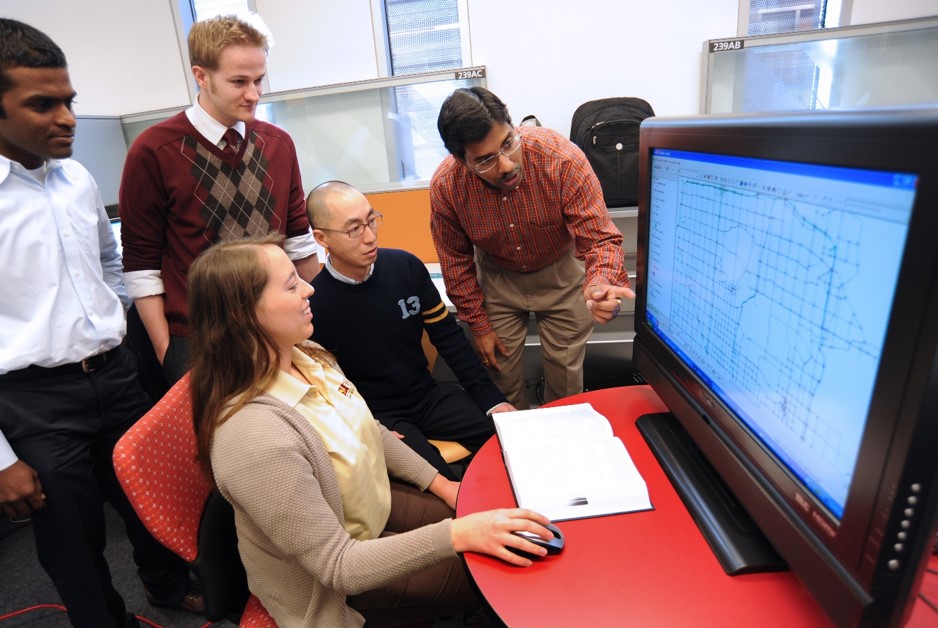Ram Pendyala
 One year ago, Dr. Ram Pendyala became the Frederick R. Dickerson Chair in the School of Civil and Environmental Engineering at Georgia Institute of Technology, bringing a wealth of experience in travel behavior and demand modeling to the Transportation Systems Engineering group.
One year ago, Dr. Ram Pendyala became the Frederick R. Dickerson Chair in the School of Civil and Environmental Engineering at Georgia Institute of Technology, bringing a wealth of experience in travel behavior and demand modeling to the Transportation Systems Engineering group.
Before joining the faculty at Georgia Tech, Dr. Pendyala taught and conducted research at the University of Louisiana at Lafayette for two years, followed by 12 years at the University of South Florida where he rose to the rank of professor. Immediately prior to stepping into his current role, Dr. Pendyala served for eight years as a Professor of Transportation Systems in the Civil, Environmental, and Sustainable Engineering Program of the School of Sustainable Engineering and the Built Environment at Arizona State University in Tempe. From his undergraduate work at the Indian Institute of Technology to his graduate degrees from the University of California at Davis, Dr. Pendyala has devoted his academic life to the field of civil engineering. Dr. Patricia Mokhtarian, another Georgia Tech faculty member, was on the faculty of UC Davis when Ram was in graduate school, and she also served on his Ph.D. Committee. Dr. Pendyala remarked that he is very excited to now be working alongside Dr. Mokhtarian as a colleague.
Dr. Pendyala is a dedicated Professor, teaching graduate courses in travel demand forecasting and travel modeling, as well as an undergraduate course in transportation engineering, this year. He has been a champion for the many transportation student organizations at Georgia Tech, including by presenting his research on activity-based travel modeling to a large group of mostly graduate students from Georgia Tech chapters of Institute of Transportation Engineers (ITE), Women’s Transportation Seminar (WTS), American Society of Highway Engineers (ASHE), and others during his first week on campus. Pendyala is pleased to be beginning his second year at Georgia Tech, ”an outstanding institution with a large and well-known transportation program, engineering alumni around the world, and many great opportunities for research and learning.” Being in Atlanta has also been a fascinating experience for Ram, who sees the city as a “living laboratory”.
|
Working with students. |
Dr. Pendyala’s work has included updating the travel demand models for several major metropolitan planning organizations to simulating different degrees of connectedness between vehicles, travelers, and infrastructure, and its effects on reducing emissions and energy cost. Another of Dr. Pendyala’s recently completed projects, for the FHWA, sought to answer the question, “How do we estimate, model, and forecast long-distance travel demand?” Unlike other model types, long-distance travel demand models generally lack detailed data. Working with a team of researchers, Pendyala was instrumental in helping to create a framework for addressing this lack of data which will soon be in use across the U.S.
Over the past few years, Dr. Pendyala has taken the lead in developing a comprehensive vehicle fleet composition and utilization model system, which simulates vehicle fleets and usage patterns for every household in a region. This model has applications across a number of scenarios, from predicting travel demand for these households to their transportation energy consumption and emissions. This model system is sensitive to the introduction of new technologies, clean energy alternatives, and market penetration of different vehicles and fuels in response to various incentive schemes. The models also have an evolutionary component built in, so that users can account for changes in vehicle fleet compositions over time, as vehicles age, then are disposed of and replaced.
Looking to the future, it would seem that not even the sky is the limit for transportation systems and technologies anymore. Pendyala stated that, “I think it is the most exciting period to be in the world of transportation; not only is the government undertaking several initiatives, but the industry has come into play in a big way… The world is going to see a revolution in transportation.” Ram and his team are planning to conduct surveys on how people might adopt and adapt to some of the revolutionary technologies that are emerging in the transportation sector. He is also interested in exploring ways to mine real-time streaming data to better understand human travel patterns and provide real-time feedback to travelers for optimizing our transportation systems. Dr. Pendyala sees many opportunities to branch beyond traditional travel demand modeling and simulation, such as the application of micro-simulation models to understand the disruption of the transportation system in a variety of natural and anthropological disaster scenarios. A goal of this research would be to develop strategies to enhance the resiliency of community transportation systems.
|
Pendyala and students perform field research. |
Pendyala and his colleagues are actively pursuing opportunities to research the activity and travel patterns of the millennial generation, to see how they compare with the generations before them. Now that the oldest millennials are reaching their mid-thirties, researchers are able to analyze data on travel behaviors of Generation X and older generations when they were in their mid-thirties. According to Ram, “We are really diving into this to see if they [the oldest millennials] are actually settling into the patterns of the previous generation and to what extent are they showing some persistent lingering differences that perhaps we can take advantage of from a planning and sustainability perspective.”
On top of his impressive research accomplishments and ambitions, Dr. Pendyala has a long list of leadership achievements within national and international research associations. Ram formerly served as the Secretary, Treasurer, Vice Chair, and then Chair of the International Association for Travel Behavior Research. His long-term involvement with the Transportation Research Board has led him to serve in several roles over the years, from being a sub-committee chair to the Chair of the Committee on Travel Behavior and Values, then on to Chair the Section on Travel Analysis Methods, and into his current role as Chair of the Planning and Environment Group. In this role, Pendyala has the opportunity to forge ties across many different committees that are concerned with transportation planning and environmental issues, through interdisciplinary workshops, collaboration with other groups, and other initiatives.
Theme by Danetsoft and Danang Probo Sayekti inspired by Maksimer


